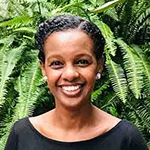Carbon Removal Technologies and Risks
A four-week online deep-dive into the carbon dioxide removal (CDR) portfolio, covering advantages, challenges, and risks of currently pursued approaches to ensure CDR investments align with emissions reduction efforts.
The course starts May 30, 2024. Enrollments close May 29.
Live sessions: Thursdays from 8:00-9:30am PT
Course level: Introductory
Taught by

Silvan Aeschlimann
Former Direct Air Capture and Storage lead at RMI
- 4 weeks / 4 hours per week
- Create a balanced, de-risked CDR solution portfolio
- Class recording available
- Completion certificate
- 100% online
About this course
This course delves into the essentials of Carbon Dioxide Removal (CDR), closely examining the portfolio of CDR solutions and dissecting the advantages, challenges, and risks associated with each approach. You’ll learn how to evaluate the potential of more than 20 CDR pathways, including biogenic solutions like afforestation, geochemical techniques such as enhanced rock weathering, and synthetic approaches like direct air capture and strategies for indirect ocean capture in different geographical contexts.
By the end of this course, you will understand the trade-offs between different CDR strategies and the most important principles to ensure that investment into CDR complements, rather than jeopardizes, emission reduction efforts.
Who is this program for?
Investors, founders, management consultants, sustainability managers, business analysts, engineers, marketing professionals, research scientists, policymakers, and more, who want to:
- Understand the investment landscape and risks associated with CDR technologies
- Develop expertise on CDR options to achieve corporate net-zero targets
- Gain insight into CDR strategies that complement emission reductions
- Learn about which CDR solutions require the most research and development funding
What climate skills you'll learn
The role of CDR in climate action
What CDR can and cannot do
Effective use of CDR
How to use CDR without jeopardizing emission reduction efforts
Assess credibility
Differentiate CDR claims that are bold but achievable from those that are likely impossible to achieve
De-risk CDR portfolio
Balance technologies at different readiness stages, with different resource requirements, and offering different levels of permanence

free event
Direct Air Capture: Climate Solution or Cover for Big Emitters?
- May 16 2024
- 8:00-9:00am PT
The Terra.do difference
Live lab groups
You will meet weekly with the instructor and fellow learners to share perspectives
Skills-based learning
You will engage in individual real-world assignments to immediately apply the skills you’ve learned
Personalized attention
Meet with the instructor 1-on-1 and get individualized feedback on your assignments
Asynchronous and synchronous learning
Flexible learning options to fit your learning style
Meet the course creator
Silvan Aeschlimann
Former Direct Air Capture and Storage lead at RMI
Course schedule
- Readings/viewing: RMI: Creating a Diversified Solutions Portfolio to Meet the Scale of the Carbon Removal Challenge, Carbon Gap: How to avoid carbon removal delaying emission reductions.
- Readings/viewing: RMI: The Applied Innovation Roadmap for CDR
- Assignment: Advise a company on their biogenic CDR portfolio with the aim of removing 10 Mt/CO2 by 2030
- Readings/viewings: Carbon 180: A buyer’s guide to high-accountability MRV, RMI: The Applied Innovation Roadmap for CDR, BCG: The time for CDR is now.
- Readings/viewings: RMI: Reality Check: This Decade Is Make-or-Break for Direct Air Capture
- Assignment: Create a balanced, de-risked CDR solution portfolio.
Pricing and expected commitment
Our fellows say it best

Sagal Abshir
"The Terra.do course and community are doing the essential work of educating us for the world to come, and coaching and inspiring us to prepare for the critical role each of us needs to play."

Shay Hader
“I came into this course not really sure I could work in the climate sector with the skills I already had, but through it, I found there's a whole realm of avenues and paths to pursue that actually need the skills I have to make a difference.”
Frequently asked questions
The course is four weeks long and will be offered from May 30 to June 20, 2024.
Live sessions will run on Thursday from 8am-9:30am PT and are structured with 60 minutes of content delivery and 30 minutes of discussion. Attendance is strongly encouraged, but recordings will also be made available.
This program is ideal for those passionate about climate change solutions, specifically in Carbon Dioxide Removal (CDR). It suits individuals seeking to enhance their expertise in CDR technologies and strategies and apply this knowledge to drive positive change in professional contexts.
Yes. No prerequisites are required for this course, and we welcome participants from all backgrounds and regions worldwide to participate.
Several organizations have learning or professional development budgets for their employees. We encourage you to enquire about and utilize this budget to attend the course. Terra.do will help you get reimbursed for the course by providing an invoice, a certificate, and any other documentation you need. If you have approval from your company, we can also arrange for your company to pay directly.
We expect to run more cohorts given ongoing demand for this course.
Financial aid is not available for this course.
If you’re unsatisfied for any reason after the first session, we’ll refund you 100%. We only request that you give us feedback so we can improve.
You can defer your enrollment up until 14 days after the course starts.
If you have a question about this course that isn’t covered in the FAQ, please email us at carbonremoval@terra.do.